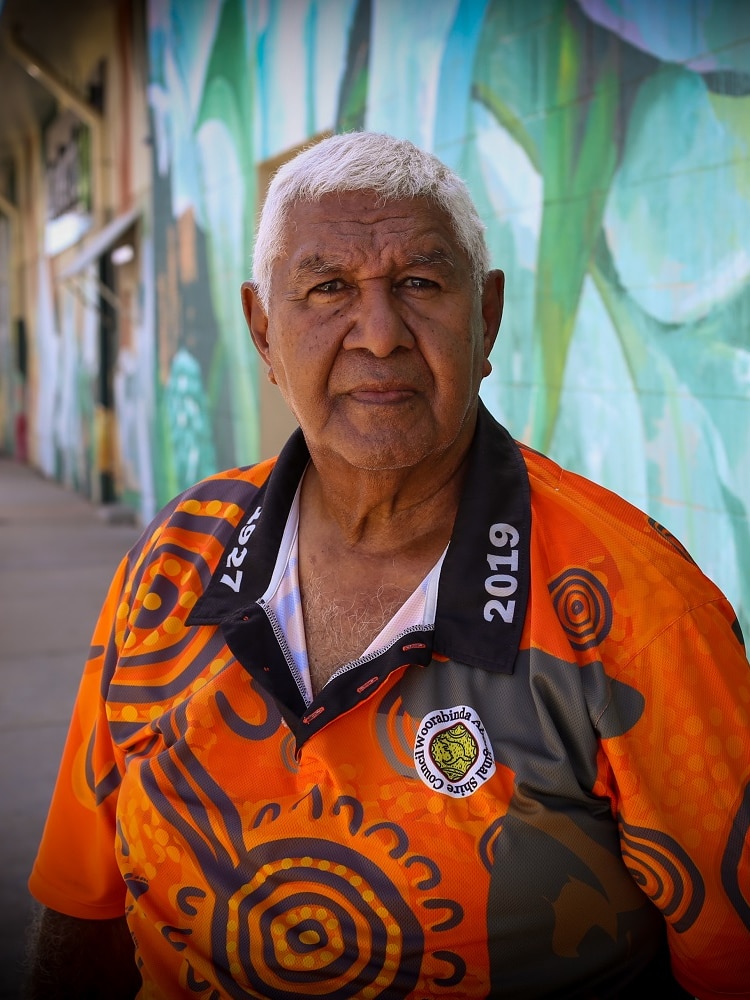Gooreng Gooreng elder Richard Johnson is relieved a federal judge has stopped a series of meetings from going ahead that could have reduced the number of traditional owners allowed to become members of a native title body corporate.
Key points:
- In January, 43 people from four native title groups applied for membership to a prescribed body corporate, which manages all native title monies
- Their application has been not been processed, and the PBC proposed a new membership structure at a special meeting
- A federal court judge has placed an injunction on the special meeting and labelled the move as “oppressive”
Mr Johnson said if the meetings had gone ahead as planned it would have had a “devastating impact” on the most vulnerable people.
The Gooreng Gooreng people are part of a four-clan group granted native title by determination in 2017, including the Bailai, Gurang, and Taribelang Bunda people in a region stretching from Gladstone to Bundaberg in Queensland.
Since January this year, 43 traditional owners have been fighting to have their membership recognised by the group’s governing body, the prescribed body corporate (PBC), which controls all native title monies.
Under the current rules, anyone who is a member of the native title group and aged over 18 can become a member, but the PBC board has not accepted these applications.
‘Oppressive’ move
It all came to a head this month when the board announced a special meeting to change its membership structure, which only the 14 current members of the PBC could vote on.
Mr Johnson said he felt compelled to encourage more people to apply for membership to have their voices heard.
“The biggest majority of those people would not have the ability to have their voices heard, and so that’s really forced me in the past few years,” he said.
The group engaged a solicitor earlier this year and, on Thursday, Justice John Halley placed an injunction on the meetings, describing the PBC’s move as “oppressive”.
Under the proposed structure, each traditional owner group would set up its own corporate entity that native title funds would go into, and each entity would appoint two directors to become members of the PBC with voting rights.
Justice Halley said if this restructure were approved and registered, the 43 people would “lose any ability to become members” of the PBC.
“I accept this would lead to irreparable prejudice to the applicants in circumstances where the applicants, by reason of the lengthy and largely unexplained delay in determining the applications for memberships, will be deprived of the ability to vote as members of [the PBC] on whether the formal adoption of an indirect representation model should be adopted,” he said.
Justice Halley said he did not accept “as somewhat colourfully claimed” by the PBC, that the injunction would create a “hostile takeover” by the would-be members.
Justice Halley said that while there would be an injunction on voting on changes, the meetings regarding the proposed restructure could still go ahead so traditional owners could express their views.
Scattered around
In his evidence, Justice Halley noted that the proposed restructure had been considered and discussed among the traditional owners, and that three of the four clan groups had already formed their corporate entities.
He also noted that the Gooreng Gooreng clan group represented 13 of the 17 apical families related to the native title determination and noted Mr Johnson’s concern that this corporate model would create inequalities.
Mr Johnson told the ABC he had been reaching out to Gooreng Gooreng since he heard of the proposed restructure, and that this had been difficult.
While most live in Bundaberg, Gladstone, and the Indigenous community of Woorabinda, a two-hour drive west of Rockhampton, others were scattered around the country.
“Not everyone is on social media, not everyone has a telephone that has range,” Mr Johnson said.
“So it’s a difficult task because most of the time we have to do face-to-face, and it’s time-consuming.”
Mr Johnson said not having the memberships accepted was “locking out those people who have been oppressed in the past by colonialism”.
“These innocent people need to have the ability to have their voices heard and to vote how their hearts lead them.”
And this could be voting for the new structure, “but I don’t think that’s going to happen”, he said.
Why the delay?
The ABC put a series of questions to PBC chairman Matthew Cooke, including why there was a delay in accepting the 43 memberships.
In a statement, Mr Cooke said the three-day summit was an opportunity to discuss “our culture, our native title business and infrastructure, our social programs, and hear further about our people’s aspirations for advancing our affairs, creating opportunities that target and address high rates of poverty and disadvantage in our peoples.”
He said the final day would be “where our people will be given a voice to choose what membership model we take forward in our native title business”.
“In relation to the court injunction, we are not at liberty to discuss this matter at this time,” Mr Cooke said.
“We are, however, pleased to see a good number of Gooreng Gooreng people in attendance including their elected leaders.”




